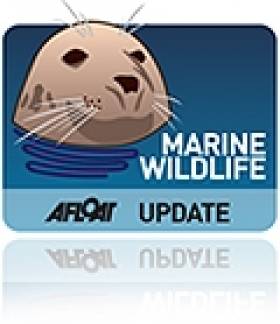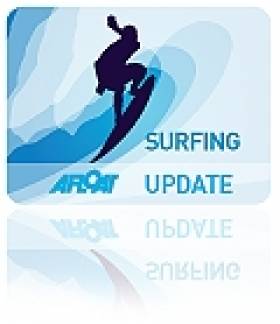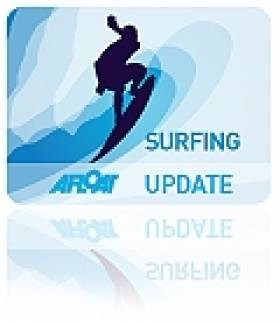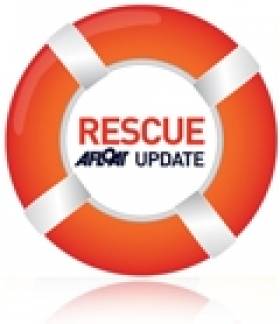Displaying items by tag: Rossnowlagh Beach
Bottlenose Dolphins Make New Home in Donegal
The Irish Independent reports that some 100 bottlenose dolphins have made a new home off the Donegal coast in the past week.
The pod of bottlenoses - a rare treat in Irish waters compared to the near ubiquitous common dolphin - has been spoted by boaters and wildlife enthusiasts in the inner Donegal Bay, between Rossnowlagh Beach and Doorin Head.
Patrick Lane of the Irish Whale and Dolphin Group said the bottlenose often swims closer to the shore than its more common counterparts, making it much easier for people on shore to catch a glimpse.
The Irish Independent has more on the story, including photos, HERE.
Sligo Surfers Tops at Rossnowlagh
Sligo have been crowned champions of 2010 after a hard-fought final at the Rossnowlagh Intercounties over the weekend.
The Sligo team's combination of veterans (David O'Donnell, Kerry Larkin) and juniors (Gearoid McDaid and Aaron O'Hare) was more than a match for Donegal's all-youth squad - which included the competition's youngest ever finalist, 10-year-old Jack Scott.
Indeed, it was the killer combination of McDaid and O'Hare - who have faced each other at every U14 final this year - that left 'the forgotten county' playing catch-up, despite a solid challenge by Donegal captain James Garvey.
O'Hare claimed first place, with McDaud second and O'Donnell in fifth, which was more than enough to clinch the Vinny Britton Cup for their county.
Meanwhile, James Garvey was presented with the Rossnowlagh Surf Club person of the year award for his contributions over the past season.
The Castlederg 16-year-old will also be featured in RTÉ's Mission Beach USA, which follows a group of young Irish surfers training with lifeguards in Florida. The programme will be broadcast on Monday 25 October at 5pm.
Rossnowlagh Intercounties This Weekend
Surfers from across the country will be converging on Donegal this weekend for the annual Rossnowlagh Intercounties from 16-17 October.
The All-Ireland event in Ballyshannon is a team competition, and is seen as an important social gathering for Ireland's surfing community.
Current forecasts for Rossnowlagh are showing low waves for the start of the weekend, with the swell expected to pick up on Sunday afternoon - which is sure to heat up the latter stages of the contest.
Best Lifesavers in Ireland Set for Donegal Challenge
Ireland's top Lifeguards will compete at Irish Water Safety's National Surf Lifesaving Championships at Rossnowlagh Beach, Donegal from 10.30am to 5pm, Saturday 11th and from 10am-1pm, Sunday 12th Sept.
Hundreds of competitors will gather from counties nationwide and teams of Lifesavers from Wales and Belfast will also compete. Included in the competitors will be the international Irish National Junior Lifesaving team which has just returned from the European finals where the boys came first in all of Europe.
Competitors at the National Championships will have their skills tested in events that simulate emergency swimming rescue scenarios. Teams will fend off strong competition from the fittest Lifeguards nationwide in this gala of lifesaving - the most significant and breathtaking life saving competition in Ireland. Irelands best Lifesavers will contend with the challenging open water conditions on the Donegal coast to rescue potential "casualties" in testing swim races, rescue board races and other events, which culminate in exciting finals throughout the day.
Commenting on the additional challenges of open water competitions, the Chairman of Irish Water Safety's Sports Commission, Jim Lawlor is confident of the team's readiness for the challenge. "Athletes will not only compete with each other while carrying their life saving equipment but also with the open water conditions of Rossnowlagh Beach. Conditions around Ireland's coast are ideal training waters for the teams as they vie for National Championship medals."
The Sport of Lifesaving has been developed to improve the standard of life guarding in Ireland and assist lifesavers save lives. The skills they have honed will demonstrate their lifesaving skills that can be such an important lifeline in an emergency.
As part of its remit to promote water safety in Ireland, Irish Water Safety trains Lifeguards employed at beaches, lakes, rivers and pools nationwide. Irish Water Safety encourages the public to learn to swim and enroll in one of the many courses nationwide in the valuable skills of water survival and lifesaving. Further information on this exciting event is available at www.iws.ie.
Take your family down to these Championships and enjoy a festival of lifesaving that may very well encourage you or a member of your family to learn these lifesaving skills.
This event attracts over 1,000 bed nights in the area in which it is held every year.
Sat 11th Sept 2010, 10.30am - 5pm
Sun 12th Sept 2010, 10.30am - 1pm
Rossnowlagh Beach, Co Donegal
Event Descriptions below.
SURF RACE
With a running start into the surf from the start line on the beach, competitors swim around the 400 m (280 m for Masters) course designated by buoys, returning to shore to finish between the finish flags on the beach.
RESCUE TUBE RESCUE
Four competitors from each team participate in this event: a "victim," one rescue tube swimmer, and two rescuers. The victim swims approximately 120 m to a designated buoy, signals, and waits to be rescued by the rescue tube swimmer. As they return to shore, the remaining two rescuers enter the water to assist. The event finishes when the first competitor in a team crosses the finish line while in contact with the victim.
BEACH FLAGS
From a prone starting position on the beach, competitors rise, turn and race to obtain a baton (beach flag) buried upright in the sand approximately 20 m away. Since there are always fewer batons than competitors, those who fail to obtain a baton are eliminated.
BEACH SPRINT
Competitors take their positions in their allotted lanes. At the starting signal, competitors race the 90 m course to the finish line. The finish is judged on the competitor's chest crossing the finish line. Competitors must finish the event on their feet in an upright position.
BEACH RELAY
Teams of four individuals (three in Masters) compete in baton relay fashion over a 90 m course. To start, two (one and two members in Masters) competitors take positions in their allotted lane at each end of the course. After the start each competitor completes a leg of the course with a baton held in either hand and passes the baton at the conclusion of the first, second, and third legs to the next runner. All competitors shall finish their leg of the event on their feet and in an upright position. Competitors are not permitted to interfere with the progress of other competitors.
SURF SKI RACE
Competitors steady their skis in line in knee-deep water about 1.5 m apart. Competitors must obey directions from the starter or check starter concerning ski alignment at the start. On the starting signal, competitors paddle their skis around the course marked by buoys and return to finish when any part of the ski crosses the in-water finish line - ridden, gripped, or carried by the competitor. Competitors may lose contact and control of their ski without necessarily being disqualified. To complete the race competitors must have (or have regained) their ski and paddle and cross the finish line from the seaward side while maintaining contact with the ski and paddle. Competitors are not permitted to hold or otherwise interfere with other competitors' skis or deliberately impede their progress.
BOARD RACE
Competitors stand on or behind the start line on the beach with their boards 1.5 m apart. At the start signal, competitors enter the water, launch their boards, and paddle the course marked by buoys, return to the beach, and run to cross the finish line. Competitors are not permitted to hold or otherwise interfere with other competitors' boards or deliberately impede their progress.
BOARD RESCUE
In this event, one member of the team swims approximately 120 m to a designated buoy, signals, and waits to be picked up by the second member of the team on a board. They both paddle to shore and cross the finish line on the beach with the board. Competitors must start from the correct allotted position. Competitors swimming to and signalling from the wrong buoy shall be disqualified.
OCEANMAN / OCEANWOMAN
(formerly Ironman / Ironwoman)
Competitors cover a 1400 m (approx.) course that includes a swim leg, a board leg, a ski leg, and a beach sprint finish. Conditions of racing of each leg are as generally required for the individual conditions of that discipline including the rules governing the component disciplines: surf ski races, board races, surf races, beach sprints.
The sequence of legs shall be determined by draw at the commencement of each competition. The same ballot shall determine the order of legs for the Oceanman / Oceanwoman Relay (formerly Taplin Relay). If the surf ski leg is first, competitors will start with a typical in-water start.



























































